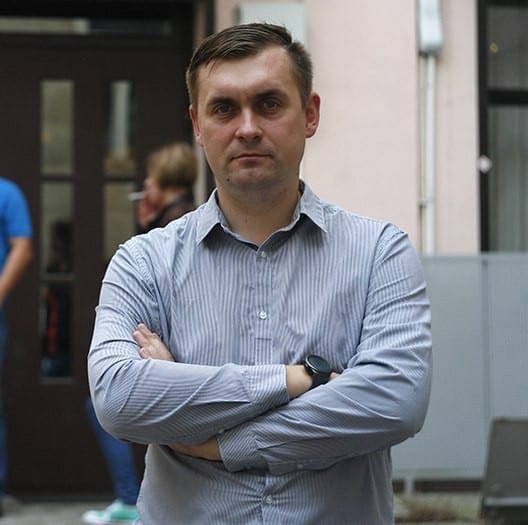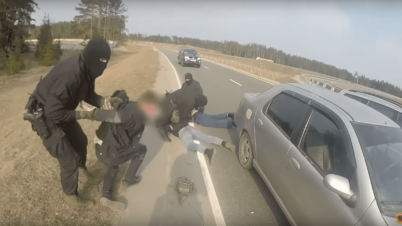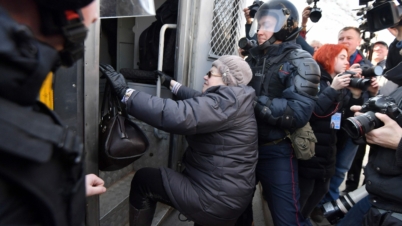En Danwatch-undersøgelse
Border authorities instrumental in Belarus regime crackdown on political opposition
Police officers detain participants in an opposition rally in the Belarusian capital Minsk on March 2017.


Police officers detain participants in an opposition rally in the Belarusian capital Minsk on March 2017.
The human rights situation in Belarus has been steadily declining since president Alexander Lukashenko took power in 1994. Political opponents, bloggers, independent journalists, environmental activists, members of an independent trade-union, and human rights activists are among those who have been persecuted.
Their only crime seems to be that they disagree with the Belarus government.
The regime has developed many tactics to harass its rivals over the years, from imposing fines on peaceful protestors to imprisoning opposition leaders on spurious charges.
The Belarusian State Border Committee (SBC), that appears to play a be central role in the crackdown on the political opposition, has received surveillance equipment worth more than €2 million from the EU, including surveillance cameras, communication equipment and patrol vehicles.
The SBC stop and harass individuals who are “uncomfortable” to the state, most often at border crossings on their return to Belarus from abroad. The harassment can include complete searches of their private belongings and communication equipment. Sometimes they are strip searched.
“I regard this as persecution for my professional activities and as an act of pressure. There is no practical sense in stopping a person at the border four times in a row”, says Andrej Stryzhak.
He is vice-chair of a local division of the Belarusian Radio and Electronics Industry Workers’ Union (REP), an independent trade-union that has been targeted by Belarusian authorities. He was stopped and searched at border checkpoints four times in the past two years, and each time he was told that it was a random stop.
The Belarussian border authorities will not comment on specific incidents, but all border stops have been made in accordance with Belarusian law and practice for European border control, Anton Bychkovskiy writes, official representative of the State Border Committee of the Republic of Belarus, in an email.

In collaboration with the Organized Crime and Corruption Reporting Project (OCCRP), Danwatch has examined 23 cases between 2012 and 2018, in which dissidents were subject to border searches. Among them are prominent human rights defenders, opposition politicians, anarchist activists, and trade unionists.
The border stops usually coincide with waves of persecution against certain groups. Andrej Stryzhak experienced border searches after REP leaders were charged by the authorities in August 2017 for evading €10,000 in taxes, after allegedly receiving a financial contribution from the Danish trade union 3F. The charges were a result of Belarusian legislation aimed to limit NGOs from receiving financial aid from foreign organisations or individuals.
Last month, the chairman and the chief accountant of REP were found guilty and sentenced to four years of “restricted freedom” and forced to step down from their managerial positions. More than 800 trade union members were interrogated during the investigation that both REP and the International Trade Union Confederation (ITUC) regard as political pressure that was applied to discredit and limit the trade union’s activities.
Although Andrej Stryzhak was told the repeated border searches were random, he says that he now knows for a fact that they were not.
“I found out during the trial against REP’s leadership that there was a request from an investigator to subject certain persons to a special inspection at border controls. Among these persons were me and my wife,” he says.
Human rights organisations have also taken notice of the harrasment of dissidents at border points.In its 2017 human rights report on Belarus, the US Department of State declares that: “Security forces continued to target prominent opposition and civil society leaders with arbitrary searches and interrogations at border crossings and airports.
The report identifies a case in which border officers searched the belongings of a prominent opposition politician, and confiscated his flash drives.
Dissidents reported that they were searched after a State Border Committee officer checked their passport and a “red signal” came up.
“When you give your passport, you can see on the border guard’s face that something is wrong. Then they call a superior. When I ask what is wrong, they say that they cannot disclose this information”, says Maria Rabkova, a political activist who has been stopped twice at border crossings over the past two years.

Maria Rabkova believes that she is on a government database of extremists, after she was identified as a suspect in a criminal case that was opened after unidentified persons threw paint at the building of the state-owned media corporation Belteleradiocompania. Most dissidents regard the media corporation as the prime deliverer of state propaganda. The case against her was eventually dropped.
“All activists who have ever attracted the attention of Belarusian security services are being stopped at the borders,” says Rabkova.
Her story is similar to the one told by Lena, a political activist who asked to remain anonymous and to be identified only by her first name. In March 2017 she was detained before attempting to participate in opposition rallies, which were shut down by the authorities. She says that she has since been stopped and searched by border agents on five separate occasions.
According to the Viasna Human Rights Centre more than 700 people were detained during the rallies, and detentions were carried out with a disproportionate use of force.
“I don’t know if they want to exert moral pressure, or demonstrate that we are watched over,” she says, adding that the stops are a “big stress”.
“Usually, when you go through a passport control, border guards separate you and tell you to wait. Then they check the passports of all other passengers on the bus, and the bus leaves. You remain at the border crossing, and you are not told what is happening.”
The first time was the worst, Lena says.
“It was not at all clear to me what would happen. The last two times, I embraced the stops with a laugh. And I make sure not to buy a direct ticket back to Minsk when I travel, in order not to lose too much money if I get stopped at the border,” Lena says.
Andrej Stryzhak of REP has seen his name marked with red on the computer screens used by the border guards.
“The border guards have a database, where they receive alerts during passport checks. Sometimes there is a possibility to peek on the screen of the passport scanning devices. There appears a red or an orange light with a text detailing what has to be done with the person. Usually, it is an inspection or seizure of certain things, for example, valuables, money or technical devices,” Stryzhak says.

The search or seizure of technical devices and communication equipment is especially worrisome according to Joshua Franco, head of Technology and Human Rights at Amnesty International, who has carried out research on Belarusian telecom surveillance.
“Device search is a type of surveillance that is very invasive. If the authorities gain access to your computer or your phone, it can reveal a lot, especially in a country like Belarus, where you penalise political opposition,” Franco says.
After border guards have received an alert you are handed over to officers of the State Customs Committee, who then conduct inspections, searches and confiscations, Lena explains.
“You are taken to a separate room. There the officers very thoroughly inspect all of your belongings. Then you are ordered to undress until you remain only in your underwear, and they look through your clothes, probe the seams, and knock the soles of the shoes. Twice they confiscated my books but then, after some time, they returned them to me. Last time, I was not let to go to a toilet until the officers had finished with the personal inspection,” she says.
Andrej Stryzhak also describes being forced to undress to his underwear. Hee regards the border searches primarily as a means to demoralise dissidents.
“I don’t think the main purpose is to get information. When you have been stopped once, you understand that you must travel ‘clean’. That is why I assume that the aim of the border stops is to apply pressure, to demoralize you and obstruct your work,” Stryzhak says.
According to Anton Bychkovskiy, official representative of the State Border Committee of the Republic of Belarus, all episodes at checkpoints have been in compliance with Belarusian law.
“Regarding the inspections at checkpoints and detentions of persons, border guard officers operated within the framework of the law, in accordance with established procedures that are within their competence. It is also a common European and world border guard practice. Further inspections and decisions regarding each particular case are beyond the competence of the border guard service. If any person reasonably believes that he was mistreated, then he has the right to file a complaint, which will be necessarily considered,” he states in an email.
This investigation was ![]() conducted in collaboration with Organized Crime and Corruption Reporting Project (OCCRP), published in the Danish Daily Politiken and financially supported with a grant from the IJ4EU fund.
conducted in collaboration with Organized Crime and Corruption Reporting Project (OCCRP), published in the Danish Daily Politiken and financially supported with a grant from the IJ4EU fund.


